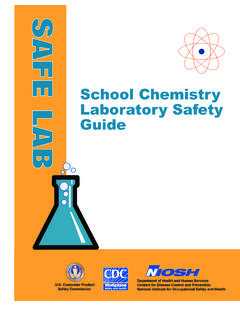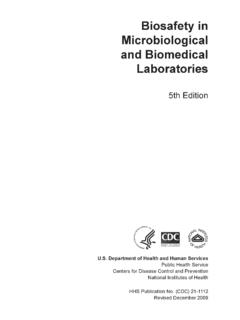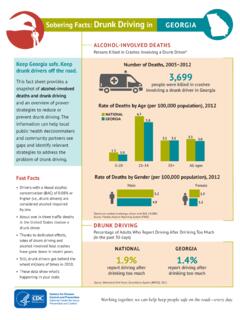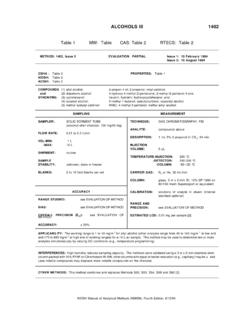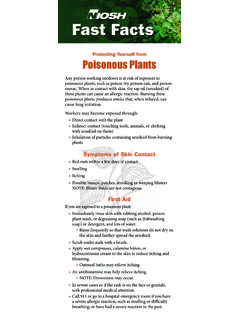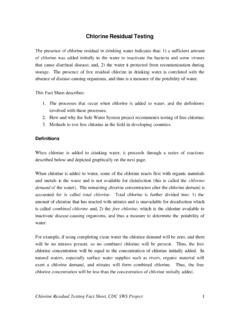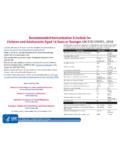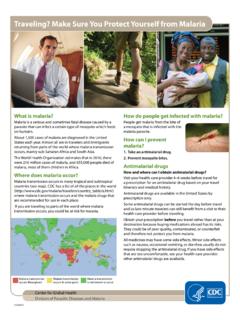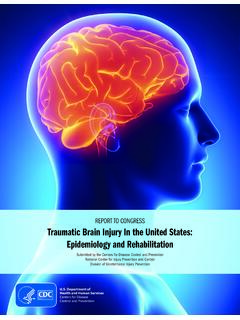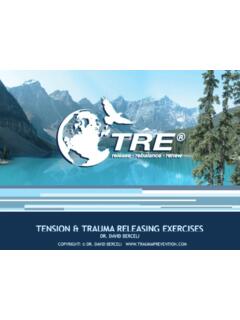Transcription of Acute Concussion Evaluation
1 RED FLAGS: Call your doctor or go to your emergency department if you suddenly experience any of the followingHeadaches that worsenLook very drowsy, can t be awakenedCan t recognize people or placesUnusual behavior changeSeizuresRepeated vomitingIncreasing confusionIncreasing irritabilityNeck painSlurred speechWeakness or numbness in arms or legsLoss of consciousnessYou have been diagnosed with a Concussion (also known as a mild traumatic brain injury ). This personal plan is based on your symptoms and is designed to help speed your recovery. Your careful attention to it can also prevent further injury . You should not participate in any high risk activities ( , sports, physical education (PE), riding a bike, etc.)
2 If you still have any of the symptoms below. It is important to limit activities that require a lot of thinking or concentration (homework, job-related activities), as this can also make your symptoms worse. If you no longer have any symptoms and believe that your concentration and thinking are back to normal, you can slowly and carefully return to your daily activities. Children and teenagers will need help from their parents, teachers, coaches, or athletic trainers to help monitor their recovery and return to Concussion Evaluation (Ace)cAre PlAnGerard Gioia, PhD1 & Micky Collins, PhD21 Children s National Medical Center2 University of Pittsburgh Medical CenterPatient Name:DOB: Age:Date: ID/MR#Date of injury :Today the following symptoms are present (circle or check).
3 ____No reported symptomsPhysicalThinkingEmotionalSleepHe adachesSensitivity to lightFeeling mentally foggyIrritabilityDrowsinessNauseaSensiti vity to noiseProblems concentratingSadnessSleeping more than usualFatigueNumbness/TinglingProblems rememberingFeeling more emotionalSleeping less than usualVisual problemsVomitingFeeling more slowed downNervousnessTrouble falling asleepBalance ProblemsDizzinessReturning to Daily lots of rest. Be sure to get enough sleep at night- no late nights. Keep the same bedtime weekdays and daytime naps or rest breaks when you feel tired or physical activity as well as activities that require a lot of thinking or concentration.
4 These activities canmake symptoms worse. Physical activity includes PE, sports practices, weight-training, running, exercising, heavy lifting, etc. Thinking and concentration activities ( , homework, classwork load, job-related activity). lots of fluids and eat carbohydrates or protein to main appropriate blood sugar symptoms decrease, you may begin to gradually return to your daily activities. If symptoms worsen orreturn, lessen your activities, then try again to increase your activities recovery, it is normal to feel frustrated and sad when you do not feel right and you can t be as active as Evaluation of your symptoms is recommended to help guide form is part of the Heads Up: brain injury in Your Practice tool kit developed by the Centers for Disease Control and Prevention (CDC).
5 Returning to School1. If you (or your child) are still having symptoms of Concussion you may need extra help to perform school-related your (or your child s) symptoms decrease during recovery, the extra help or supports can be removed the teacher(s), school nurse, school psychologist or counselor, and administrator(s) about your (or your child s) injury and symptoms. School personnel should be instructed to watch for: Increased problems paying attention or concentrating Increased problems remembering or learning new information Longer time needed to complete tasks or assignments Greater irritability, less able to cope with stress Symptoms worsen ( , headache, tiredness) when doing schoolwork~Continued on back page~ SCHOOL VERSION Returning to should NEVER return to play if you still have ANY symptoms (Be sure that you do not have any symptomsat rest and while doing any physical activity and/or activities that require a lot of thinking or concentration.)
6 Sure that the PE teacher, coach, and/or athletic trainer are aware of your injury and is normal to feel frustrated, sad and even angry because you cannot return to sports right away. With any injury , a fullrecovery will reduce the chances of getting hurt again. It is better to miss one or two games than the whole following are recommended at the present time:___ Do not return to PE class at this time ___ Return to PE class___ Do not return to sports practices/games at this time ___ Gradual return to sports practices under the supervision of an appropriate health care provider. Return to play should occur in gradual steps beginning with aerobic exercise only to increase your heart rate( , stationary cycle); moving to increasing your heart rate with movement ( , running); then adding controlledcontact if appropriate; and finally return to sports competition.
7 Pay careful attention to your symptoms and your thinking and concentration skills at each stage of activity. Moveto the next level of activity only if you do not experience any symptoms at the each level. If your symptoms return,stop these activities and let your health care professional know. Once you have not experienced symptoms for aminimum of 24 hours and you receive permission from your health care professional, you should start again at theprevious step of the return to play Return to Play physical levels of physical activity ( , ). This includes walking, light jogging, light stationary biking, light weightlifting (lowerweight, higher reps, no bench, no squat).
8 3. Moderate levels of physical activity with body/head movement. This includes moderate jogging, brief running, moderate- intensity stationary biking, moderate-intensity weightlifting (reduced time and/or reduced weight from your typical routine). non-contact physical activity. This includes sprinting/running, high-intensity stationary biking, regular weightlift-ing routine, non-contact sport-specific drills (in 3 planes of movement). contact in controlled contact in game play.*Neuropsychological testing can provide valuable information to assist physicians with treatment planning, such as return to play referral plan is based on today s Evaluation :___ Return to this office.
9 Date/Time___ Refer to: Neurosurgery____ Neurology____ Sports Medicine____ Physiatrist____ Psychiatrist____ Other____ ___ Refer for neuropsychological testing___ Other ACE Care Plan Completed by:_____ MD RN NP PhD ATC Copyright G. Gioia & M. Collins, 2006 Returning to School (Continued)Until you (or your child) have fully recovered, the following supports are recommended: (check all that apply)__No return to school. Return on (date)__Return to school with following supports. Review on (date)__Shortened day. Recommend ___ hours per day until (date)__Shortened classes ( , rest breaks during classes). Maximum class length: _____ extra time to complete coursework/assignments and homework load by _____%.
10 Maximum length of nightly homework: _____ significant classroom or standardized testing at this for the return of symptoms (use symptom table on front page of this form) when doing activities that require a lot of attention or concentration. __Take rest breaks during the day as meeting of 504 or School Management Team to discuss this plan and needed supports.
